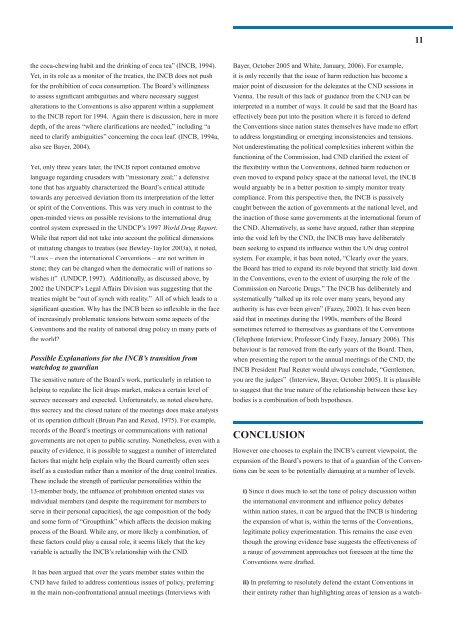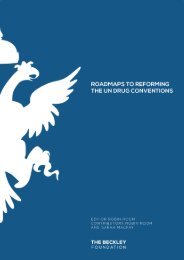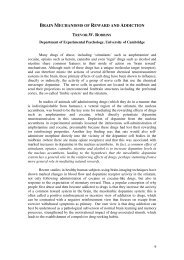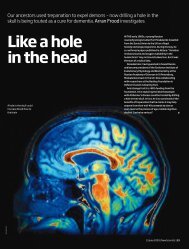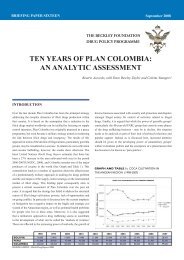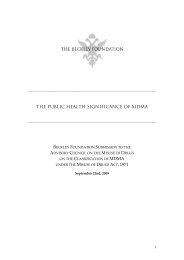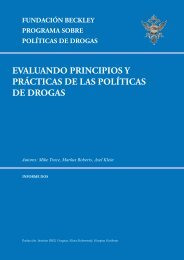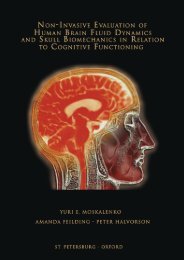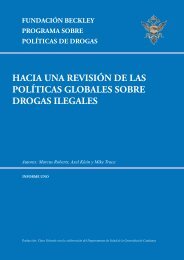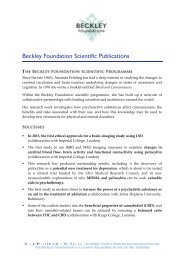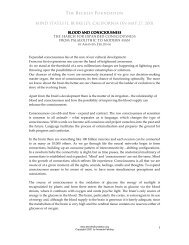Watchdog or Guardian of the UN Drug Control Conventions?
Watchdog or Guardian of the UN Drug Control Conventions?
Watchdog or Guardian of the UN Drug Control Conventions?
- No tags were found...
Create successful ePaper yourself
Turn your PDF publications into a flip-book with our unique Google optimized e-Paper software.
11<strong>the</strong> coca-chewing habit and <strong>the</strong> drinking <strong>of</strong> coca tea” (INCB, 1994).Yet, in its role as a monit<strong>or</strong> <strong>of</strong> <strong>the</strong> treaties, <strong>the</strong> INCB does not pushf<strong>or</strong> <strong>the</strong> prohibition <strong>of</strong> coca consumption. The Board’s willingnessto assess significant ambiguities and where necessary suggestalterations to <strong>the</strong> <strong>Conventions</strong> is also apparent within a supplementto <strong>the</strong> INCB rep<strong>or</strong>t f<strong>or</strong> 1994. Again <strong>the</strong>re is discussion, here in m<strong>or</strong>edepth, <strong>of</strong> <strong>the</strong> areas “where clarifications are needed,” including “aneed to clarify ambiguities” concerning <strong>the</strong> coca leaf. (INCB, 1994a,also see Bayer, 2004).Yet, only three years later, <strong>the</strong> INCB rep<strong>or</strong>t contained emotivelanguage regarding crusaders with “missionary zeal;” a defensivetone that has arguably characterized <strong>the</strong> Board’s critical attitudetowards any perceived deviation from its interpretation <strong>of</strong> <strong>the</strong> letter<strong>or</strong> spirit <strong>of</strong> <strong>the</strong> <strong>Conventions</strong>. This was very much in contrast to <strong>the</strong>open-minded views on possible revisions to <strong>the</strong> international drugcontrol system expressed in <strong>the</strong> <strong>UN</strong>DCP’s 1997 W<strong>or</strong>ld <strong>Drug</strong> Rep<strong>or</strong>t.While that rep<strong>or</strong>t did not take into account <strong>the</strong> political dimensions<strong>of</strong> initiating changes to treaties (see Bewley-Tayl<strong>or</strong> 2003a), it noted,“Laws – even <strong>the</strong> international <strong>Conventions</strong> – are not written instone; <strong>the</strong>y can be changed when <strong>the</strong> democratic will <strong>of</strong> nations sowishes it” (<strong>UN</strong>DCP, 1997). Additionally, as discussed above, by2002 <strong>the</strong> <strong>UN</strong>DCP’s Legal Affairs Division was suggesting that <strong>the</strong>treaties might be “out <strong>of</strong> synch with reality.” All <strong>of</strong> which leads to asignificant question. Why has <strong>the</strong> INCB been so inflexible in <strong>the</strong> face<strong>of</strong> increasingly problematic tensions between some aspects <strong>of</strong> <strong>the</strong><strong>Conventions</strong> and <strong>the</strong> reality <strong>of</strong> national drug policy in many parts <strong>of</strong><strong>the</strong> w<strong>or</strong>ld?Possible Explanations f<strong>or</strong> <strong>the</strong> INCB’s transition fromwatchdog to guardianThe sensitive nature <strong>of</strong> <strong>the</strong> Board’s w<strong>or</strong>k, particularly in relation tohelping to regulate <strong>the</strong> licit drugs market, makes a certain level <strong>of</strong>secrecy necessary and expected. Unf<strong>or</strong>tunately, as noted elsewhere,this secrecy and <strong>the</strong> closed nature <strong>of</strong> <strong>the</strong> meetings does make analysis<strong>of</strong> its operation difficult (Bruun Pan and Rexed, 1975). F<strong>or</strong> example,rec<strong>or</strong>ds <strong>of</strong> <strong>the</strong> Board’s meetings <strong>or</strong> communications with nationalgovernments are not open to public scrutiny. None<strong>the</strong>less, even with apaucity <strong>of</strong> evidence, it is possible to suggest a number <strong>of</strong> interrelatedfact<strong>or</strong>s that might help explain why <strong>the</strong> Board currently <strong>of</strong>ten seesitself as a custodian ra<strong>the</strong>r than a monit<strong>or</strong> <strong>of</strong> <strong>the</strong> drug control treaties.These include <strong>the</strong> strength <strong>of</strong> particular personalities within <strong>the</strong>13-member body, <strong>the</strong> influence <strong>of</strong> prohibition <strong>or</strong>iented states viaindividual members (and despite <strong>the</strong> requirement f<strong>or</strong> members toserve in <strong>the</strong>ir personal capacities), <strong>the</strong> age composition <strong>of</strong> <strong>the</strong> bodyand some f<strong>or</strong>m <strong>of</strong> “Groupthink” which affects <strong>the</strong> decision makingprocess <strong>of</strong> <strong>the</strong> Board. While any, <strong>or</strong> m<strong>or</strong>e likely a combination, <strong>of</strong><strong>the</strong>se fact<strong>or</strong>s could play a causal role, it seems likely that <strong>the</strong> keyvariable is actually <strong>the</strong> INCB’s relationship with <strong>the</strong> CND.It has been argued that over <strong>the</strong> years member states within <strong>the</strong>CND have failed to address contentious issues <strong>of</strong> policy, preferringin <strong>the</strong> main non-confrontational annual meetings (Interviews withBayer, October 2005 and White, January, 2006). F<strong>or</strong> example,it is only recently that <strong>the</strong> issue <strong>of</strong> harm reduction has become amaj<strong>or</strong> point <strong>of</strong> discussion f<strong>or</strong> <strong>the</strong> delegates at <strong>the</strong> CND sessions inVienna. The result <strong>of</strong> this lack <strong>of</strong> guidance from <strong>the</strong> CND can beinterpreted in a number <strong>of</strong> ways. It could be said that <strong>the</strong> Board haseffectively been put into <strong>the</strong> position where it is f<strong>or</strong>ced to defend<strong>the</strong> <strong>Conventions</strong> since nation states <strong>the</strong>mselves have made no eff<strong>or</strong>tto address longstanding <strong>or</strong> emerging inconsistencies and tensions.Not underestimating <strong>the</strong> political complexities inherent within <strong>the</strong>functioning <strong>of</strong> <strong>the</strong> Commission, had CND clarified <strong>the</strong> extent <strong>of</strong><strong>the</strong> flexibility within <strong>the</strong> <strong>Conventions</strong>, defined harm reduction <strong>or</strong>even moved to expand policy space at <strong>the</strong> national level, <strong>the</strong> INCBwould arguably be in a better position to simply monit<strong>or</strong> treatycompliance. From this perspective <strong>the</strong>n, <strong>the</strong> INCB is passivelycaught between <strong>the</strong> action <strong>of</strong> governments at <strong>the</strong> national level, and<strong>the</strong> inaction <strong>of</strong> those same governments at <strong>the</strong> international f<strong>or</strong>um <strong>of</strong><strong>the</strong> CND. Alternatively, as some have argued, ra<strong>the</strong>r than steppinginto <strong>the</strong> void left by <strong>the</strong> CND, <strong>the</strong> INCB may have deliberatelybeen seeking to expand its influence within <strong>the</strong> <strong>UN</strong> drug controlsystem. F<strong>or</strong> example, it has been noted, “Clearly over <strong>the</strong> years,<strong>the</strong> Board has tried to expand its role beyond that strictly laid downin <strong>the</strong> <strong>Conventions</strong>, even to <strong>the</strong> extent <strong>of</strong> usurping <strong>the</strong> role <strong>of</strong> <strong>the</strong>Commission on Narcotic <strong>Drug</strong>s.” The INCB has deliberately andsystematically “talked up its role over many years, beyond anyauth<strong>or</strong>ity is has ever been given” (Fazey, 2002). It has even beensaid that in meetings during <strong>the</strong> 1990s, members <strong>of</strong> <strong>the</strong> Boardsometimes referred to <strong>the</strong>mselves as guardians <strong>of</strong> <strong>the</strong> <strong>Conventions</strong>(Telephone Interview, Pr<strong>of</strong>ess<strong>or</strong> Cindy Fazey, January 2006). Thisbehaviour is far removed from <strong>the</strong> early years <strong>of</strong> <strong>the</strong> Board. Then,when presenting <strong>the</strong> rep<strong>or</strong>t to <strong>the</strong> annual meetings <strong>of</strong> <strong>the</strong> CND, <strong>the</strong>INCB President Paul Reuter would always conclude, “Gentlemen,you are <strong>the</strong> judges” (Interview, Bayer, October 2005). It is plausibleto suggest that <strong>the</strong> true nature <strong>of</strong> <strong>the</strong> relationship between <strong>the</strong>se keybodies is a combination <strong>of</strong> both hypo<strong>the</strong>ses.CONCLUSIONHowever one chooses to explain <strong>the</strong> INCB’s current viewpoint, <strong>the</strong>expansion <strong>of</strong> <strong>the</strong> Board’s powers to that <strong>of</strong> a guardian <strong>of</strong> <strong>the</strong> <strong>Conventions</strong>can be seen to be potentially damaging at a number <strong>of</strong> levels.i) Since it does much to set <strong>the</strong> tone <strong>of</strong> policy discussion within<strong>the</strong> international environment and influence policy debateswithin nation states, it can be argued that <strong>the</strong> INCB is hindering<strong>the</strong> expansion <strong>of</strong> what is, within <strong>the</strong> terms <strong>of</strong> <strong>the</strong> <strong>Conventions</strong>,legitimate policy experimentation. This remains <strong>the</strong> case eventhough <strong>the</strong> growing evidence base suggests <strong>the</strong> effectiveness <strong>of</strong>a range <strong>of</strong> government approaches not f<strong>or</strong>eseen at <strong>the</strong> time <strong>the</strong><strong>Conventions</strong> were drafted.ii) In preferring to resolutely defend <strong>the</strong> extant <strong>Conventions</strong> in<strong>the</strong>ir entirety ra<strong>the</strong>r than highlighting areas <strong>of</strong> tension as a watch-


